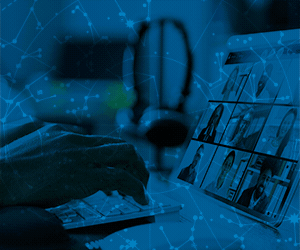Thompson noted that challenges still exist with flexible work policies, such as managing on-campus parking costs and space considerations. However, the survey indicated that when it comes to remote work, the opportunities outweigh the challenges, she said.
How the University of Illinois Manages a Remote Cybersecurity Staff
Managing remote employees is one thing, but having a cybersecurity staff working offsite poses its own unique challenges. Taylor Judd, director of information security at UIUC, said the university received additional cybersecurity funding, which raised the team’s headcount from 14 to 50. Adding staff means that collaboration and transparency among the team members and other departments is more important than ever — and that can be challenging by the very nature of cybersecurity roles, Judd said.
“We as cybersecurity professionals tend to be very secretive,” he said. “We very intentionally tried to break out of that mold, especially as a remote team. We have been very intentional about reaching out, developing processes and standards. The need for collaborative projects is even more important in a remote work environment. How are you connected to your data center people? How are you connected to help desks? How are you connecting to your networking team?”
DISCOVER: Find out how a modernized digital experience can improve hybrid work.
Rather than focusing on whether employees are productive at all hours of the workday, Judd said leaders should focus on what matters to them as an organization. For him, it’s customer service.
“Are tickets not just being closed, but are they being closed in a timely fashion?” Judd said. “I honestly don’t care if a ticket is closed every day or not. What I do care about is if it’s been open for two weeks or longer and nobody has responded to it, because that’s a customer service loss.”
Using data to track performance can help identify gaps in coverage and productivity, and staying in constant communication with all team members ensures that managers do not lose track of the projects everyone is working on.
The cybersecurity team also embarked on a three-month pilot of a 4/10 work schedule, where employees worked four days a week for 10 hours a day. A survey after the pilot revealed that the schedule resulted in a 46 percent improvement in throughput, and employees reported better work-life balance and overall job satisfaction, Judd said.













